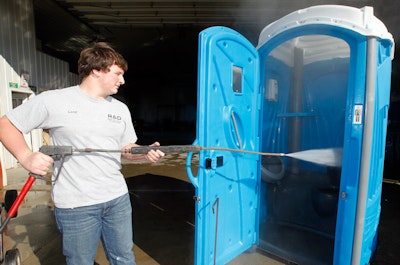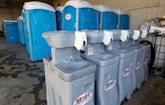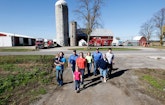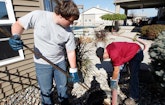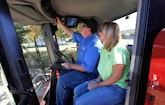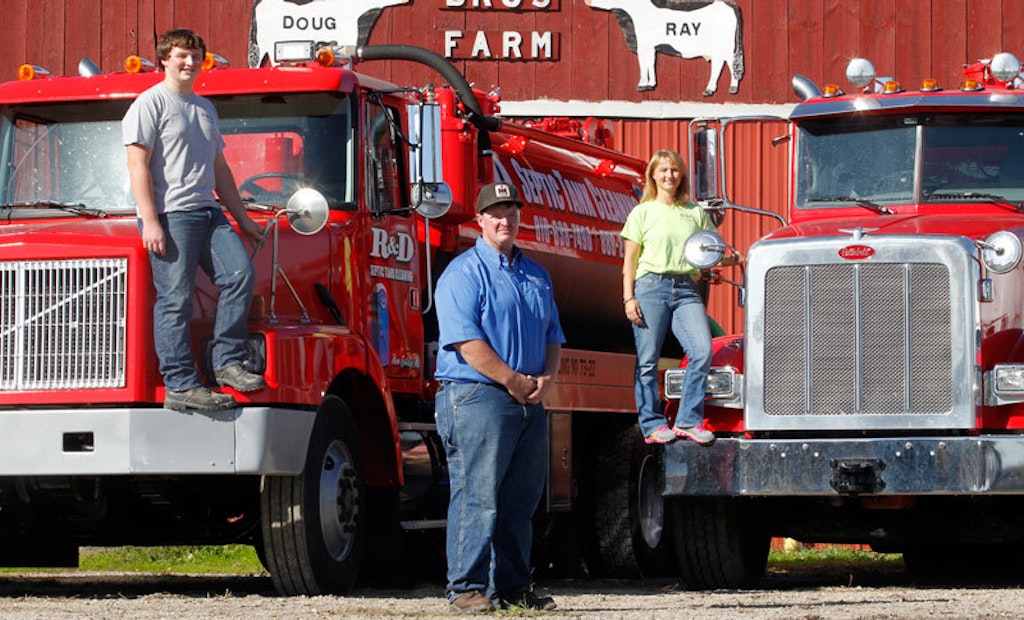
Interested in Pumps?
Get Pumps articles, news and videos right in your inbox! Sign up now.
Pumps + Get AlertsRay Birchmeier is a fourth-generation Michigan farmer. And up until the spring of 2012 he also had 120 cows to milk twice a day. But when times got tough, he and his brother Doug added a septic service and portable restroom business to their daily chores. It turned out to be a good move.
But then the unthinkable happened. Doug, only 41, died suddenly of an aneurysm. It was a devastating personal loss for the family. But with remarkable foresight, the brothers had put in place a business plan that protected the company and continued to provide an income for the surviving family.
The Birchmeier family’s company, R & D Septic Tank Cleaning & Portable Restroom Rental, is located in New Lothrop, Mich., about 90 miles north of Detroit. The name says it all – “We just strictly pump tanks and do portable restrooms,” Ray says. When he gets requests for system installations or repairs, he refers them to other businesses in the area.
The company turned out to be the brothers’ ticket to getting out of the dairy business and in the spring of 2012 they sold their herd. It was an enormous relief, Ray says.
“You have no idea. You just don’t realize how much work it is when that’s all you’ve known.” Unfortunately the joy of their newfound freedom was short-lived as less than six months later Doug collapsed while parking a combine in the yard.
PLAN FOR THE WORST
It was another family tragedy that led to the brothers putting a survivorship contingency plan in place when they formed the company. Their father, David, died at 57 of a heart attack a few years before they started their business. That influenced them to take a realistic approach and consider the consequences should one of them die.
Working with Northwestern Mutual Life Insurance Company, the brothers each took out personal life insurance policies payable to their families. But Northwestern also helped them set up a buy-sell agreement funded by life insurance policies on each of them with the other as beneficiary so that should something happen to one of them the other would buy out his share of the business, using the insurance proceeds as a down payment.
Buy-sell agreement: A buy-sell agreement between co-owners of a business spells out the ownership arrangement the parties want should one of them die. Generally it specifies that the surviving partner will buy out the deceased partner’s portion of the business from the heirs, and that the heirs must sell rather than participate in the business. But it can be set up however the parties wish and it can be revised at any time, Ray says. The document could also cover other triggering events such as disability or retirement.
In their case, the document stipulates that Ray is to buy out Doug’s share of the business over a period of one to 30 years, at his discretion. But the length of time can be anything, Ray says. “Obviously if somebody’s older when they started, you’re going to want it to pay out sooner. But we were 30 years old when we did this.”
Another example of customization will show up in the agreement Ray is now setting up with his younger brother, Ed, who has stepped in to work with him in the business. The life insurance company will draw up the same paperwork he had with Doug with the exception that he wants to specify that, should something happen to him, his son will have the right, if he wishes, to be part of the business.
Life insurance: The life insurance the partners have on each other is intended to help the surviving party begin buying out the business under the terms outlined in the buy-sell agreement. The amount of insurance varies with every situation based on any number of factors, Ray says. It could be anything from how much insurance the parties can afford to a general guess about the future potential value of the business.
“You set it up to a dollar amount you can live with,” he says. “Some people might not be able to afford much so you might do something that just gets you by and keeps you in business. Another one might pay the other person off 100 percent. It’s not the cheapest thing in the world, but it’s not that expensive either. My brother and I just came up with a price that we thought was basically enough to keep us in business and make it so that we wouldn’t have to sell anything.” It also has immediate value for the surviving spouse, he says. “By you giving them some money up-front, that will allow them to take care of some bills on their personal end, too.”
After Doug’s passing, the business was evaluated by an appraiser and a value determined. The insurance policy paid off in about a month and Ray used that to start making payments to Doug’s wife, Beverly, and their children Danielle, 3, and David, 1.
More advice: Ray advises that business owners have a plan for who will do the work should something happen to them or any partners they may have. He was lucky to have family members who were available to immediately step in and make sure all the work got done. For the most part he says his clients never knew anything happened because nothing changed.
On a personal level, Ray says the best piece of advice he can give is to set up a trust. “You need a trust. It basically protects all your assets so you have plenty of time to distribute them over a period of time as opposed to maybe having to sell them off and pay a bunch of taxes on it. It also keeps it out of probate.”
Ray encourages everyone to face facts and be prepared for the possibility – the certainty, really – of a death. “Obviously nobody is comfortable talking about things like this,” he says. “But I would have to say, talk about it, bring these things up because everybody is going to die. You don’t know when but you might as well have things in order so it’s easier to move on when it does happen. If you don’t it can get real chaotic.”
STRONG SUPPORT SYSTEM
Although R & D was a 50-50 partnership between Ray and Doug, it’s always been a family-run business. In addition to Ed and Bernie Gengler, Ray’s father-in-law, Ray’s wife Heidi handles the books, and their kids, Lane, 15, Ondrea, 13, and Lacy, 10, help with washing and stocking units. Lane is also starting to help with deliveries.
Ray’s sister, Nancy Birchmeier, a schoolteacher, does paperwork, deliveries, pumping and route mapping. His cousin, Randy Griffin, occasionally helps out with pumping. “He works in a laser factory but if I need him when we can’t go pump a tank, I just give him a call and he goes out and does it,” Ray says. He also enlists the help of a retired neighbor.
PLOWING AND PUMPING
The Birchmeier family grows corn, soy, wheat and hay on their 1,000 acres. In 2003 prices started to drop. At about the same time, Bernie was looking for work since he suddenly lost his job. Putting it all together, Ray came up with the idea of doing septic work on the side.
“I was racking my brain; what can we do to supplement our income and that just popped into my mind,” he says. “We needed something that would work with farm work. We’re good mechanics, we can fix things, we know what hard work is and it wasn’t that big a deal for us.”
After getting buy-in from Doug, the brothers set up a business, bought a tandem 1996 Volvo vacuum truck with a 3,000-gallon steel tank, put an ad in the local phone book and went to work. Although they’re in a rural part of the state, Ray says there’s a lot of residential population to the east on septic systems.
After a couple years, the business had grown to the point where they needed another vacuum truck and they picked up a 1993 Volvo built out by Quality Tank Trucks & Equipment with a 4,000-gallon steel tank. And by fall 2012 they added a 2013 Peterbilt outfitted by Advance Pump & Equipment Inc. with a 4,000-gallon stainless steel tank. The septic trucks all have Masport Inc. liquid-cooled pumps.
TAKING A HINT
Ray says the local tavern forced them to get into the portable restroom business in about 2005. “They were going to have an outside shindig and wanted eight or 10 units. The guy asked me if I had any. When I said no he said, ‘If you don’t get some I’m going to get them from one of your competitors.’” Ray bought 10 Five Peaks Aspens.
“I hated it at first,” he says. “I was running them all across the county, just to do 10.” But each year they picked up 10 or 15 more, and the more they had the easier it became. “Now I’ve got 150 of them and so every 10 or 15 minutes I’m stopping to drop one off or pump one, so now it works out real well.” The company’s standard units are light blue Aspens, augmented by 15 Satellite Industries wheelchair-accessible Liberties and 20 Five Peaks hand-wash stations.
Ray works within about a 60-mile radius of New Lothrop, mostly for local events and house parties. “I really try to stay away from construction,” he says. “It’s not worth it. I like to keep them nice for the customers.” He also would prefer not to put units out in the winter since it’s hard on them and a hassle for him. Vehicles and equipment are stored year-round in a barn on the family farm where Ray’s mother, Willo, lives. “That was top priority when we had the cattle around because of the flies. And then the dust we created from farming would just get them dirty,” he says.
He has two vacuum trucks for portable sanitation. One is a pre-owned 2006 Ford F‑550 with a 600-gallon waste/250-gallon freshwater stainless steel tank. The other he built himself. “I took an old farm anhydrous tank and cut it down,” he says. It’s a 500-gallon waste/250-gallon freshwater steel tank on a 2000 Chevy 3500. Both have Conde pumps (Westmoor Ltd.). He also built his transport trailers – “Just some snowmobile trailers I made up myself. One’s a 14-place and three are 10s.” He gets his deodorizers from Walex Products.
Today about 75 percent of the company’s work is septic. Waste is taken to a treatment plant 35 miles away, but Ray says he may pursue land application in the future. Although it’s not easy because of the legal requirements, he says it’s worth considering since he has the land for it and it would save time and money.
BETTER DAYS AHEAD
With the support of his family and his own efforts to give good service, to be on time and to have nice-looking equipment, Ray has created a successful business and knows his idea back in 2003 was a good one.
“It’s actually worked so well for us it’s unbelievable,” he says. “I’m really blessed with a lot of family and knowledgeable people that can get things done.”
The loss of Doug has been a terrible blow for the family but at least the brothers took precautions to protect their families financially in the event of a loss. “Most young people don’t think like that,” Ray says. “But we saw it when our dad passed away.”
MORE INFORMATION
Advance Pump & Equipment, Inc. - 877/557-7867 - www.advancepump.com
Five Peaks - 866/293-1502 - www.fivepeaks.net
Masport, Inc. - 800/228-4510 - www.masportpump.com
Quality Tank Trucks & Equipment - 877/635-0001 - www.qualitytanktrucks.net
Satellite Industries - 800/328-3332 - www.satelliteindustries.com
Walex Products Co., Inc. - 800/338-3155 - www.walex.com
Westmoor, Ltd. - 800/367-0972 - www.westmoorltd.com
